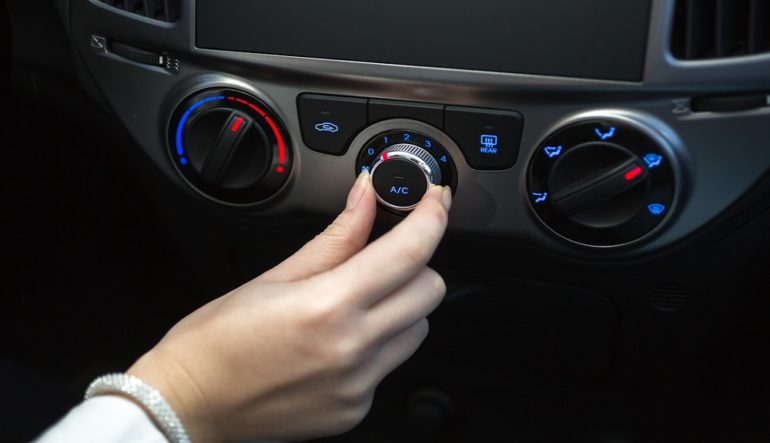These days, we don’t really think about our car air conditioner unless it’s hot outside or if it’s broken. There was a time, however, that this now common feature was only an option on more expensive luxury vehicles. It’s inconceivable today to imagine a modern automobile that doesn’t have an air conditioner, either as part of a complex climate control system or as a straightforward standalone component.
It’s no surprise that so many car owners take their air conditioners for granted, often waiting until it’s too late to call a professional car air conditioning service.
Keeping your car air conditioner well-maintained isn’t just about keeping you comfortable amidst the heat. It can be important for your safety as well.
A car air conditioner doesn’t just keep the interior of your car cool, it also dehumidifies it, preventing mist from constantly building up on the inside parts of your windshield and windows. This can be critical during rainy weather or in especially humid climates.
We made this basic car air conditioning service guide to help explain what you really need to know when it comes to vehicle air conditioners as well as help you find out when it’s time to service your air conditioner as well.
To understand what can go wrong, it’s important to know how air conditioners work first.
How does a car air conditioner work?
While there are countless makes and models in the market, they all work on the same principle. That is to say, a car air conditioning service in Bentley or any other parts of Western Australia that owners might go to will pretty much do the same operations as any regular car aircon services.
All car air conditioners (as well as refrigerators and home air conditioners) rely on the latent heat of vaporization principle. They all use chemicals that can easily convert from a gas into a liquid and vice-versa. These chemicals are called refrigerants, and R134a is by far the most commonly used in car air conditioners. These gases are circulated within a closed system that cleverly transfers the heat from inside the cabin and takes it outside.
The refrigerant is pressurized by a motorized compressor that squeezes it into a liquid, raising its temperature, and forcing it into a condenser. The condenser is a series of pipes or fins that allow this heat to quickly dissipate, rapidly cooling the chemical and beginning the process of turning it into a gas again.
From there, the cooled liquid goes to an evaporator, the part that cools your cabin, through a small opening. When it passes through this hole, it causes a drop in temperature that causes it to turn into gas. This process lets the gas absorb the heat inside your car’s cabin, cooling it. The evaporator also has fans to help the process along and distribute the cooler air through your vehicle. From the evaporator, the hot gas then goes back to the compressor to repeat its journey.
While the concept is elegant, there are many different things that can go wrong, especially in an older vehicle. Each model has different levels of complexity and some may be more prone to leakage and dirt intrusion than others, which can reduce the effectiveness of your car air conditioner or render it useless. This makes it important to have a qualified car air conditioning service check your car’s air conditioning and climate control systems at regular periods or at the first sign of trouble.
When should my car’s air conditioner be checked?
Car air conditioning units should ideally be checked at these times:
- Before summer
- At the onset of winter or the wet season in humid climates
- If you smell a foul odour
- If the car has been immersed in water
- If there are unusual noises
- If it no longer functions as well as it used to
- As part of annual comprehensive vehicle checkups
What will a car air conditioning service do?
Depending on the problems you are experiencing with your cars’ air conditioner, your car air conditioning service may recommend any of a number of different procedures. Most routine jobs will involve at least the following:
- Checking for leaks
- Checking for sensor failures
- Disinfecting or replacing filters
- Replacing refrigerants
- Replacing corroded rubber and silicone components
Having your air conditioner checked also has benefits beyond just keeping your car’s interiors cool. Important benefits from having your car’s air conditioning serviced regularly include:
- Fog-free windows and windshields
- A safer, more comfortable ride
- Better fuel efficiency
- Less wear on the engine
How often should I have to re-gas my car’s air conditioner?
Modern vehicle air conditioners can typically last as long as 5 years before they may need to be re-gassed. On the other hand, most manufacturers recommend you do this once a year or every two years. Even the most expensive vehicles will typically lose a small, but not insignificant amount of refrigerant gas over time – up to 10% in one year, in some cases. Older, as well as lower-priced vehicles, tend to fare worse.
When possible, have your car’s air conditioning checked whenever you have your car’s annual checkup. This isn’t just for your comfort and safety either. A poorly-maintained air conditioning unit will tend to put a greater strain on your car’s engine. Well-maintained air conditioning systems don’t have to work as hard to maintain an optimal temperature, therefore require less work from your engine.
Whatever your car type is, be sure to maintain your car’s air conditioner. Not only will it help you drive more comfortably and safely, but it will also help keep your car from depreciating prematurely.
If you’re in or around Welshpool, check out this 24-Hour Welshpool auto-service for aircon maintenance and more.

